
Ringworm Causes: What Is Ringworm Caused By on Skin? Know Key Reasons
Introduction:
Reviewed by Dermatologist - Dr. Ruchir Shah (MD Dermatology)
⭐ 10,000+ Online Dermatology Consultations Completed
Hello, I’m Dr. Ruchir Shah, Consultant Dermatologist.
If you’re wondering what ringworm is caused by, why it keeps spreading, or why your ringworm infection is not healing, you’re not alone.
Ringworm is one of the most common fungal skin infections seen in India, and many patients search online for answers like:
- What is ringworm caused by?
- Is ringworm caused by sweat or poor hygiene?
- What is the main cause of ringworm on skin?
In this blog, you’ll learn the exact causes of ringworm, how this infection spreads on the skin, and when you should consult a dermatologist for effective treatment.
If you’re dealing with a persistent or recurrent ringworm infection, you can get a free online dermatologist skin consultation with a certified dermatologist using Coupon Code: FPCND100 and receive expert guidance from the comfort of your home.
What Is Ringworm and How Is It Caused?
Ringworm is a fungal skin infection, medically known as tinea infection. It is commonly referred to as ringworm, jock itch, or tinea, depending on the area of the body affected.
Despite its name, ringworm is not caused by a worm.
Ringworm is causes by fungi, specifically a group called dermatophytes.
In fact, over 40 species of fungi can be responsible for ringworm infection.
The most common fungi responsible for ringworm causes include:
- Trichophyton
- Microsporum
- Epidermophyton
How Does Ringworm Infection Start?
Ringworm usually begins as a small itchy pimple or papule. As the fungi grow on the skin, they spread outward and form circular, ring-shaped plaques, which is why people often search for “ringworm causes by fungus” or “cause of ringworm on skin.”
These fungi thrive in:
- Warm environments
- Moist or sweaty skin
- Tight clothing
- Poor air circulation
This is why ringworm causes due to sweating, humidity, and skin friction are extremely common. Clinically, it appears as a red, itchy, scaly rash with a clear center, and without proper treatment, the infection can spread to other body areas or even to family members.
Know more about - How fungal infection evolves in skin, its stages, symptoms, and prevention methods.
Continue reading this blog to clearly understand ringworm causes, ringworm infection causes, the cause of ringworm on skin, and how to stop it from spreading effectively with dermatologist-guided treatment.
Reasons and Factors - Ringworm Is Caused by
Fungal spores can live on skin, clothing, towels, and even soil for long periods. Ringworm causes by several different sources of transmission, and it spreads to humans (which causes ringworm) in five ways:
- Person to Person
- Animal to human
- Through sweat and moisture
- By coming in contact with fomites of the infected person
- By direct contact with soil carrying the fungus
Person to Person:
Direct skin contact with an infected person is one of the most common ringworm causes. Sharing personal items like combs, towels, clothes, or bedsheets increases the risk significantly. This is why sibling management is crucial if your child has a ringworm.
Animal to Human:
Ringworm can also be caused by infected animals, if you touch an animal that is infected with ringworm or even objects that have come in contact with that animal. Cats and dogs are common sources, but other animals, such as animals living in farms, can spread the fungal/ ringworm infection.
By Excessive Sweat And Moisture:
If you sweat a lot, your inner parts remain wet due to sweat and moisture, you have been roaming around the whole day wearing wet clothes as in rainy season, then you can get ringworm due to sweat, moisture and wetness. If you previously have had a ringworm infection, and you are not taking care of the personal hygiene and not keeping the inner parts dry, then ringworm infection may recur.
By Contact with Infected Objects Or Person (Fomites)
You can get ringworm infection if you come in contact with an object or surface, such as a telephone or the floor of a public bathroom, the clothes, sheets, towels, or handkerchiefs of an infected person. If you use a western toilet and a person who has ringworm has used it, and then you use it and sit on it, then you can also get ringworm.
By Direct Contact With Soil Carrying The Fungus:
Ringworm can be caused by Humans, and animals can get ringworm infection through direct contact with soil containing the fungus or direct exposure to soil containing dermatophyte fungi. This often affects those working in farming or gardening. Soil containing the fungus can spread ringworm infection.
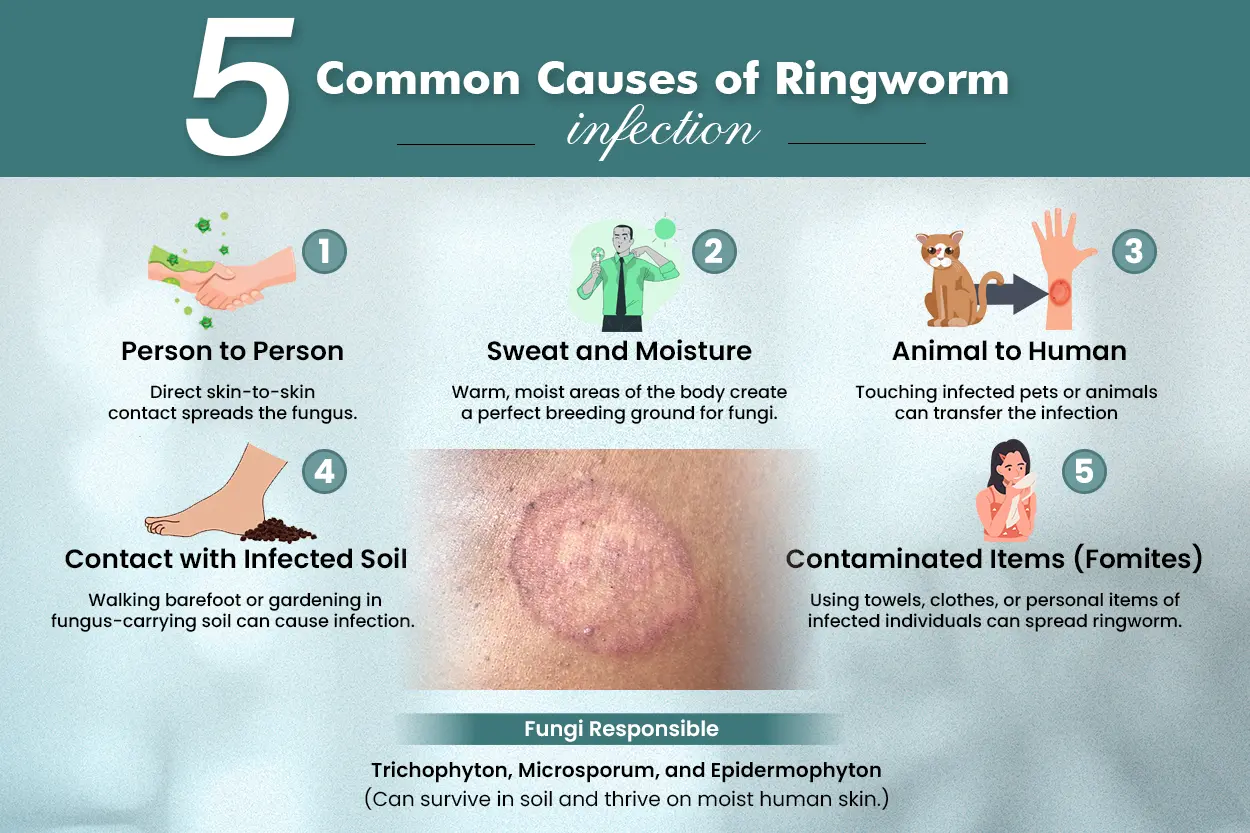
Now that you know what causes ringworm, find out how to treat and cure ringworm fast in our complete guide to Ringworm Treatment and Cure.
Who Is More Likely To Get a Ringworm Infection?
Understanding what causes ringworm infection or causes of ringworm can help you take preventive steps. You are more likely to get a fungal infection if you:
- Live in a place with a warm climate - Excessive sweating in a hot and humid environment can cause ringworm. If you live in such a place, you should make it a habit to wipe your inner parts with a dry cloth whenever you sweat.
- Weak immune system - If you have an underlying disease or a condition like diabetes, in which the immunity of your body decreases. Ringworm can spread quickly in such a person and does not go away quickly. In such cases, fungal infection home remedies are usually ineffective, and professional medical treatment is strongly recommended.
- Participate in Sports (Athletes) - If you participate in sports (athlete), then you can get ringworm on your inner parts due to excessive sweating. This is called jock itch fungus in English to get Fungal Jock Itch Treatment consult a dermatologist. This is a common factor in what causes ringworm infection.
- Are Male - Men are generally more likely to get ringworm infections compared to women, possibly due to higher sweat production and skin friction in certain areas.
- Share Personal Items - Sharing towels, clothing, or grooming items with others can spread fungal spores, making it easier for ringworm to occur. This habit directly contributes to what causes ringworm infection.
Tips To Prevent The Spread Of Fungal Infection
Ringworm is a highly contagious condition and can spread very easily from one person to another. It can also spread easily by contact of the hand you have itched to other parts of your body, or even to someone else's body. Follow the hygienic lifestyle tips mentioned below to prevent it from spreading further:
- Wear Loose-Fitting And Cotton Clothes
If you are thinking that wearing tight clothes or covering your body tightly will absorb the sweat and prevent further spread of the infection, but doing so will lock in moisture and slow down the healing process. Wear loose-fitting clothes, preferably made of cotton or other natural fabrics. This will wick away sweat and prevent the condition from worsening. Also, make sure you change your clothes at least once a day, as wearing the same clothes for more than a day can worsen the symptoms.
- Change Bedsheets Every Day
Just like you change your clothes every day, changing bedsheets and pillow covers everyday are also of importance. Because ringworm is very contagious, the fungus may get transferred through your bedsheets. If you sleep in these contaminated sheets every night, this can worsen the symptoms and infection can spread to other parts of your body, as well as to other people you share your bed with.
- Use Anti-Fungal Medicines
To prevent the spread of fungal/ ringworm infection to the other parts of your body and to reduce symptoms, it is always recommended to consult a dermatologist. A dermatologist can prescribe you the anti-fungal medication like ketoconazole, luliconazole, amorolfine, itraconazole, etc. These ingredients kill the germs and reduce the infection. While topical antifungal products can significantly reduce symptoms, they cannot completely cure the condition without the help of oral medication. A dermatologist not only prescribes you proper medication but can also advice you on do's and don'ts of ringworm infection. It is always advisable to keep the areas dry and use powder once the infection is cured and course from a dermatologist is completed. It helps to absorb the sweat that you get in these areas.
Always Remember
- Make others aware of your condition. This can help them take adequate precautions.
- Consult a skin specialist doctor. He will diagnose your disease and give you the right course of medication, moreover, he can educate you on what ringworm is caused by and get a tailored treatment plan.
- Do not use medicines like steroids. This can worsen your problem further.
Click below to connect with SkinMate, your AI-Powered Dermatology Nurse:
Start an instant WhatsApp chat now! Worried about what caused your ringworm? Consult a certified dermatologist instantly on WhatsApp with SkinMate — your AI Dermatology Assistant.
Other Services We Offer at Neodermatologist
If you are looking for treatment beyond fungal infections, check out our other dermatology services:
Online Hair Treatment Consultation
Click the links to explore our online dermatologist services and consult with a skin specialist from the comfort of your home
Conclusion
Ringworm may not be a life-threatening infection, but it is important to diagnose and treat it promptly. This can prevent the infection from spreading to other parts of the body. For this, it is very important to see a dermatologist. By taking a continuous course of medication for one and a half to two months, ringworm is completely cured. Staying away from what ringworm is caused by or in other words ringworm causes/ ring worm infection causes is the most important thing to prevent it and its recurrences.
M.B., D.V.D. | Registration No.: G-41460
A dermatologist specializing in tele-dermatology, offering expert care for skin, hair, and nail concerns. With extensive clinical experience, provides effective treatments for acne, hair fall, eczema, vitiligo, hives, scalp issues, ringworm, fungal infections, and more - all accessible through convenient online consultations.
 Hin
Hin En
En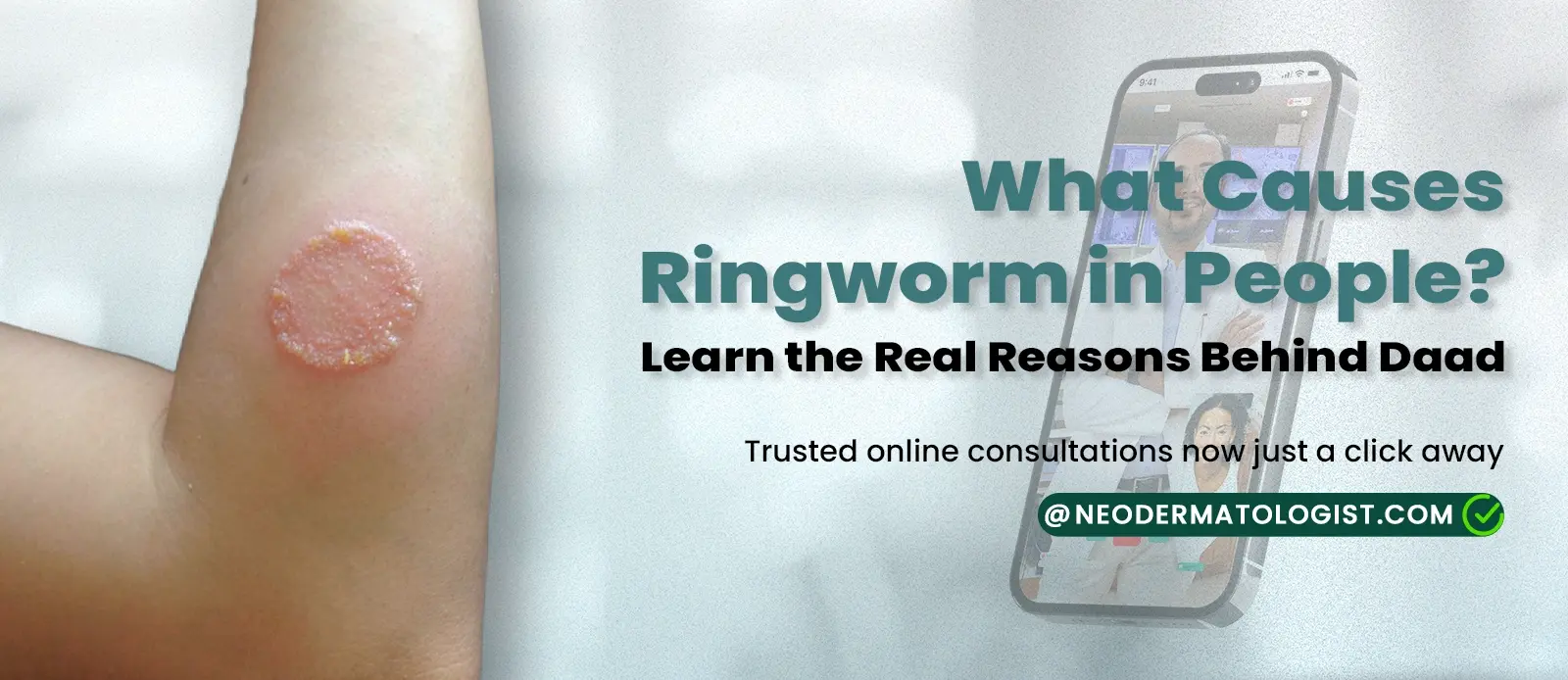
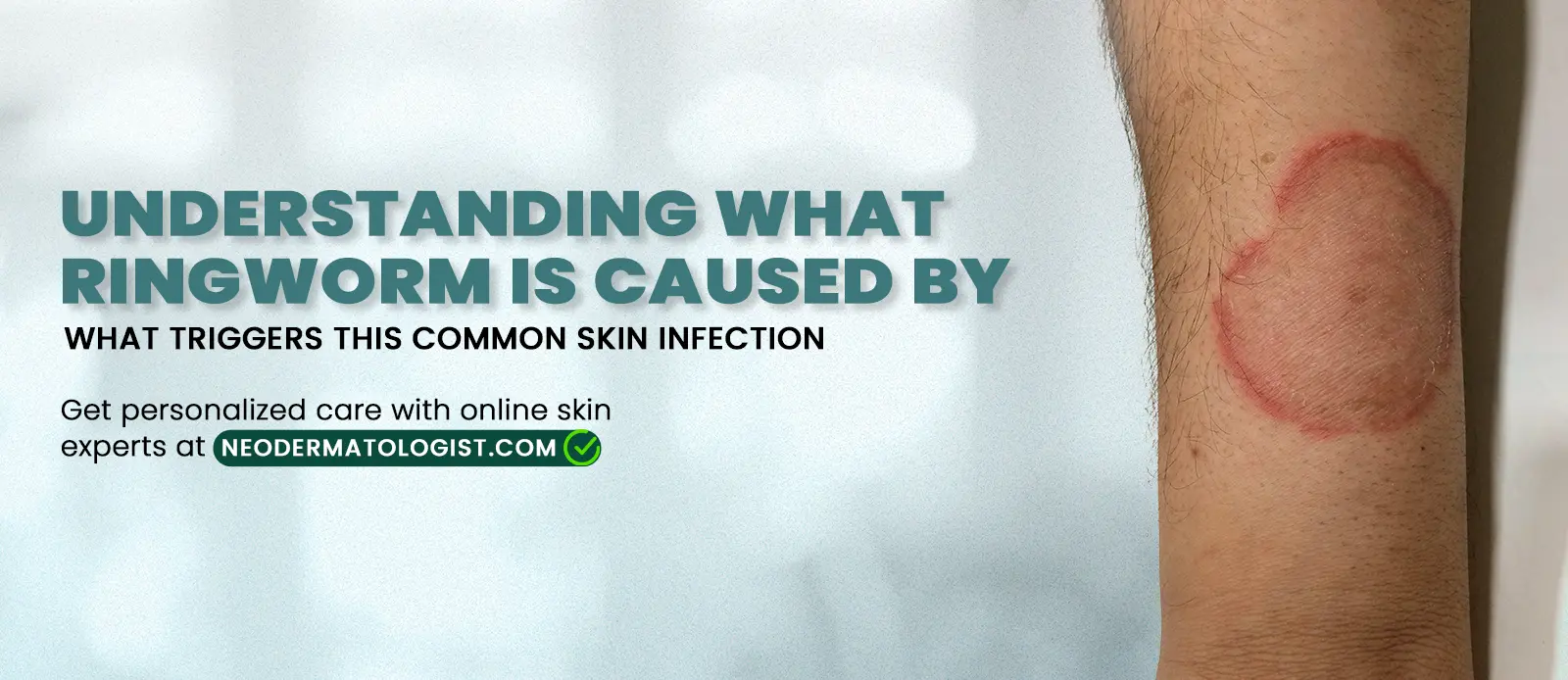
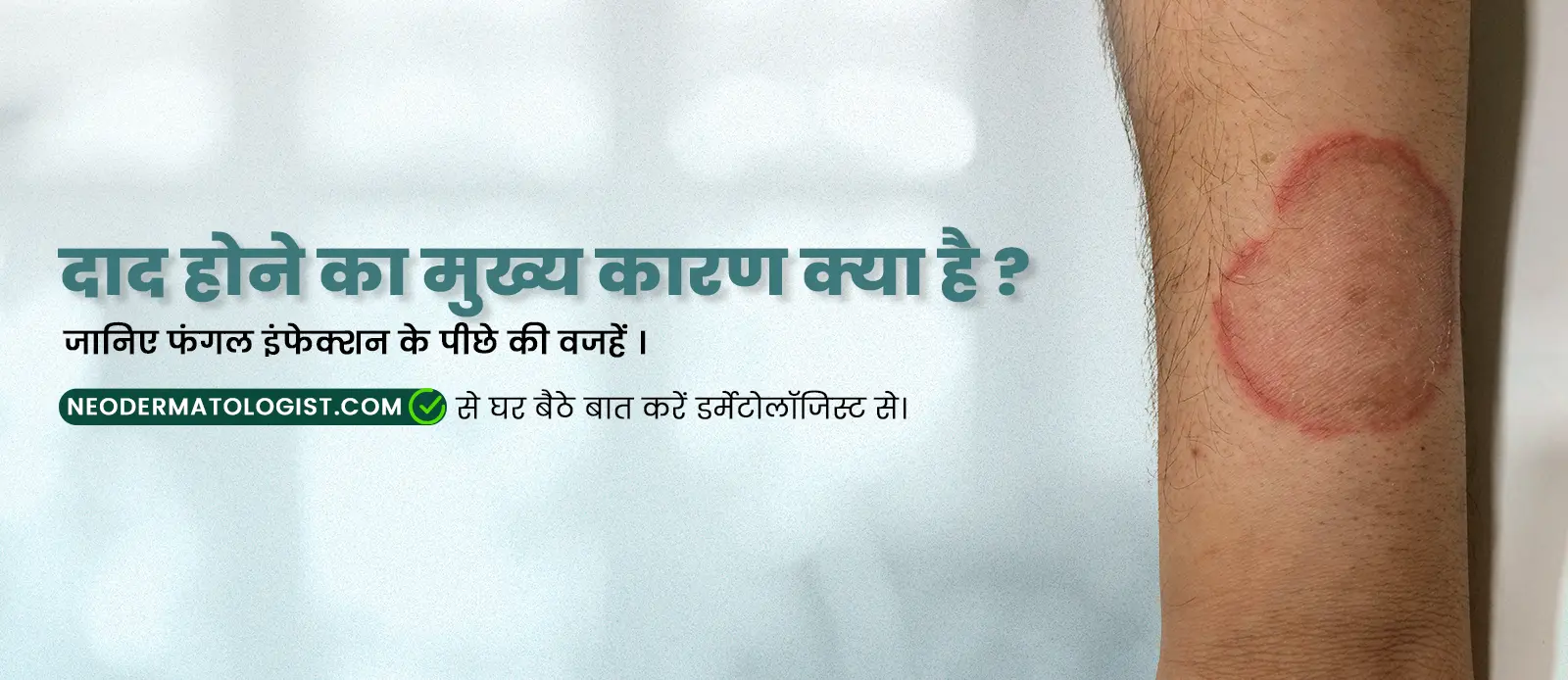

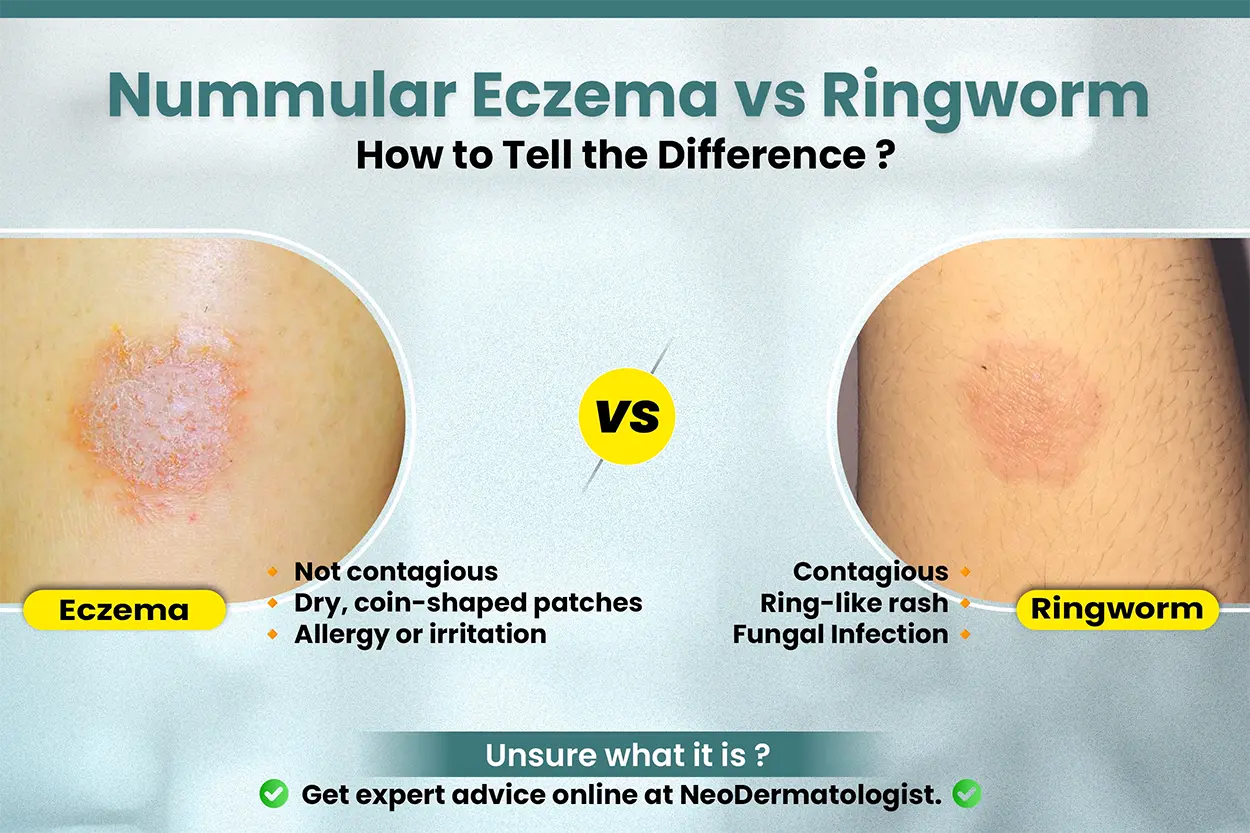
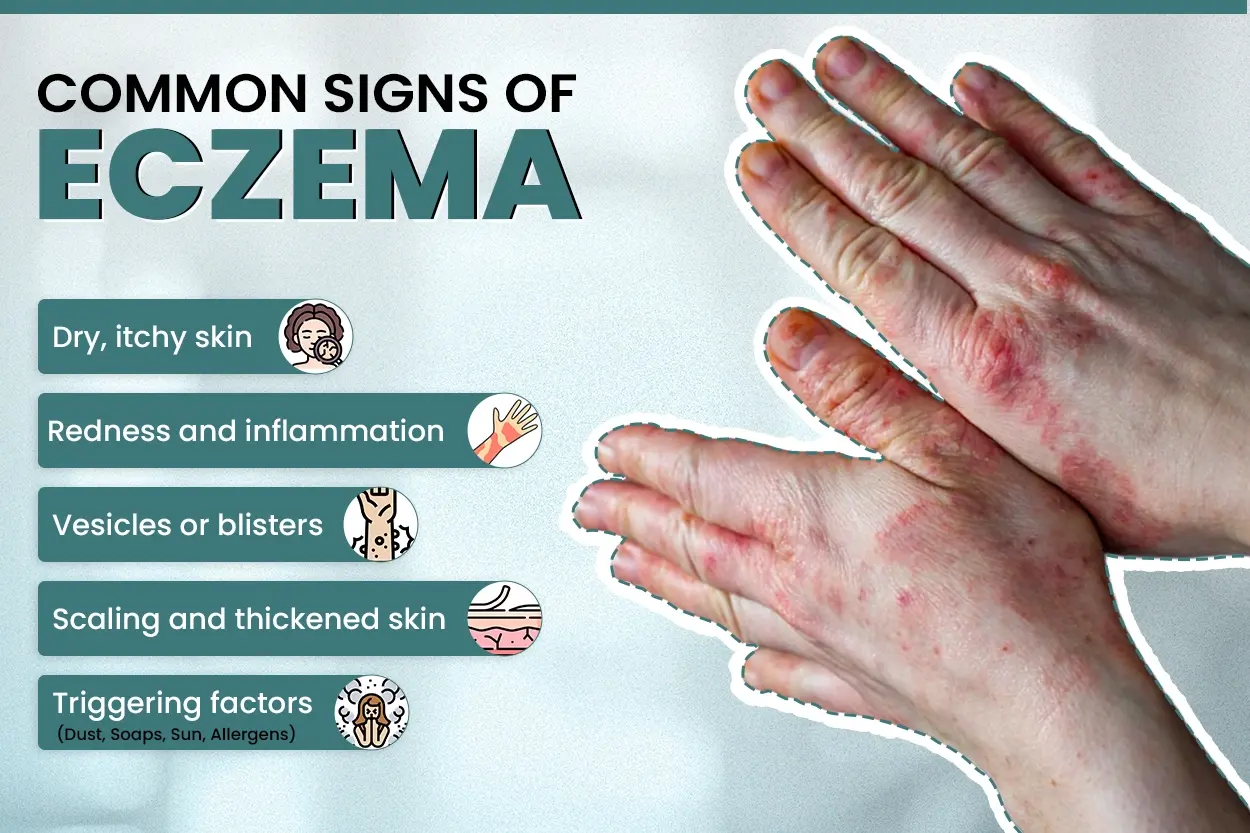
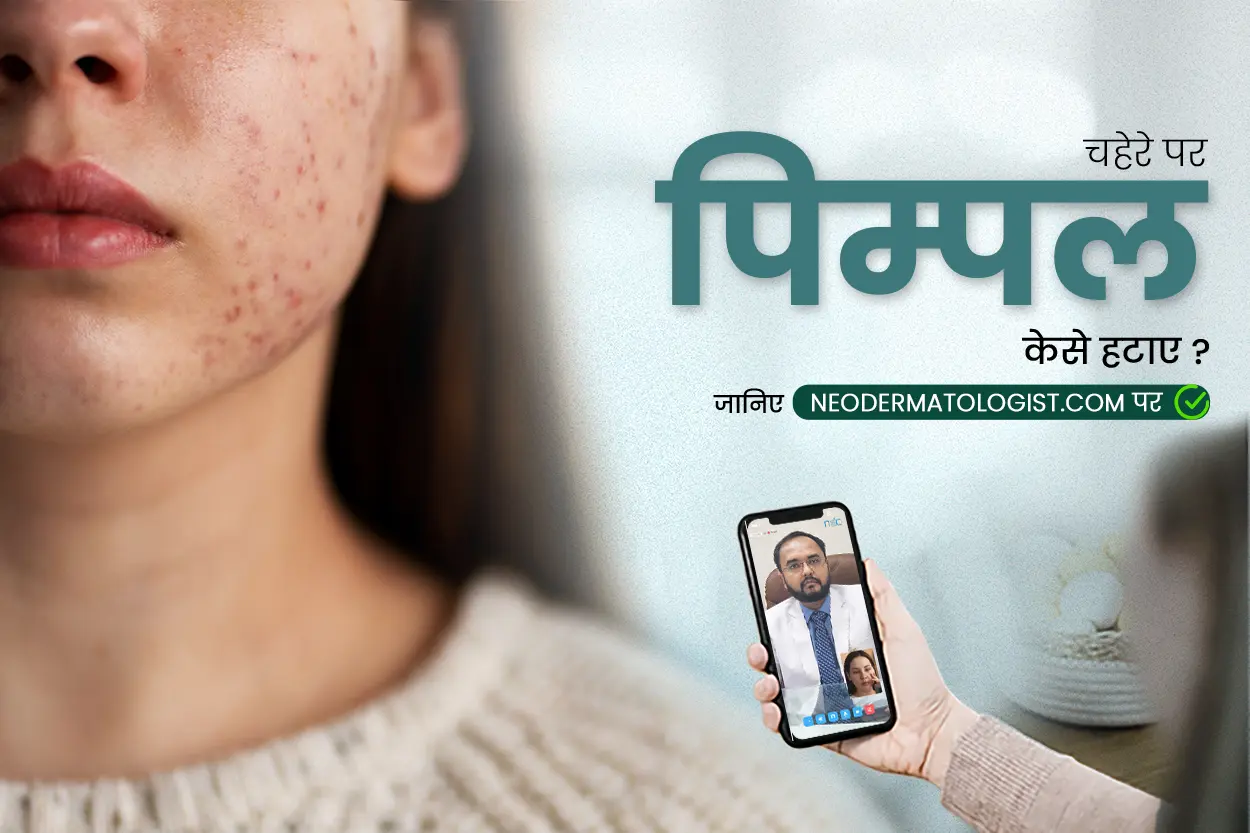
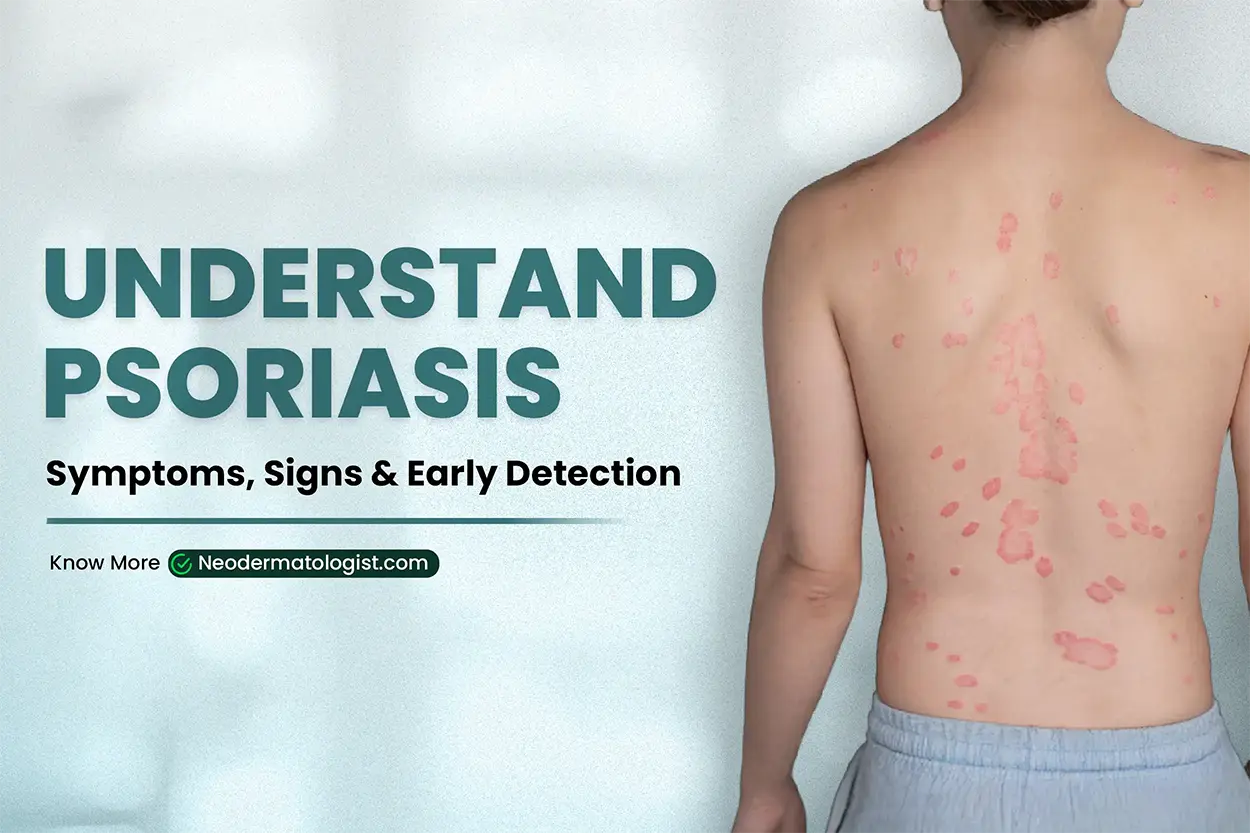
















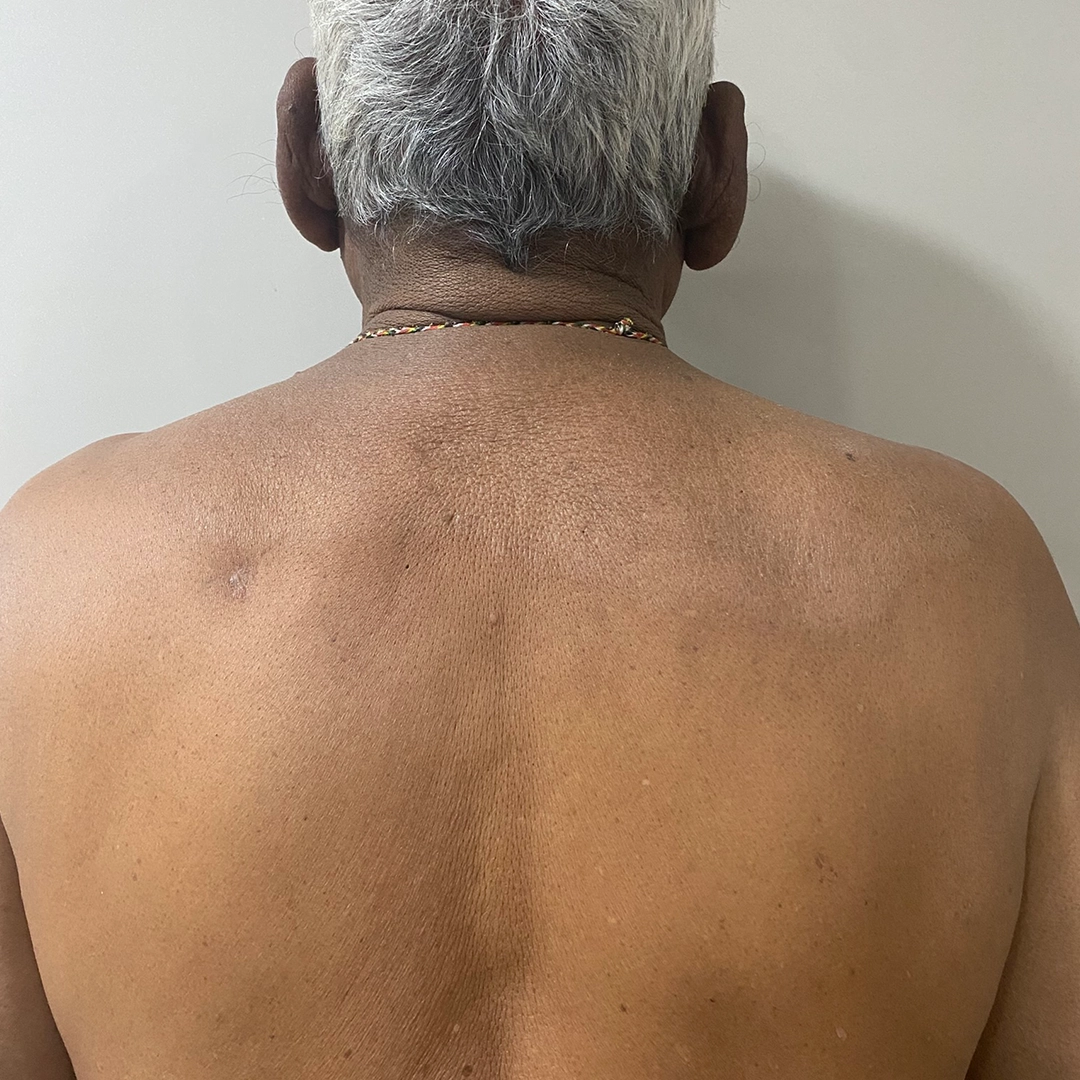
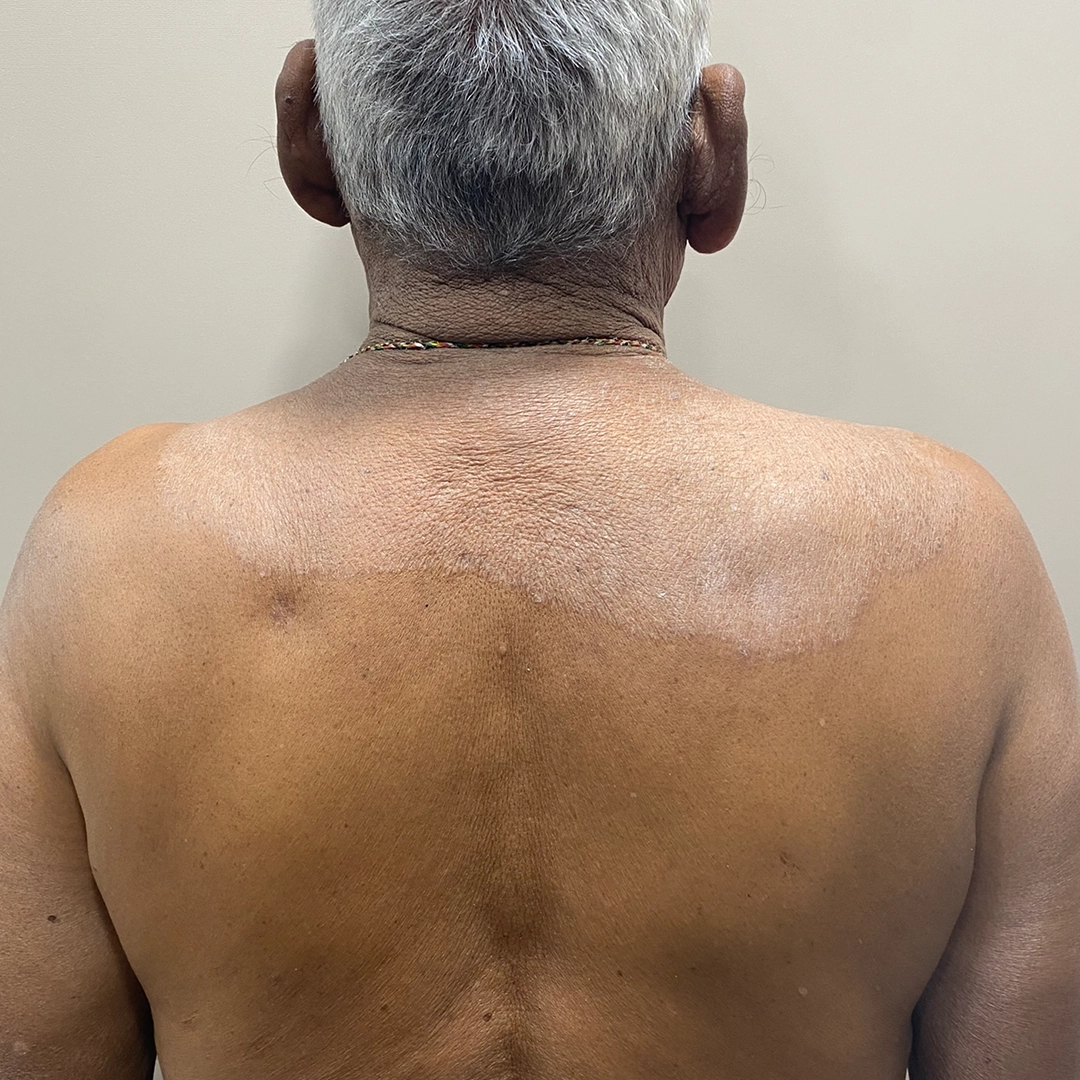
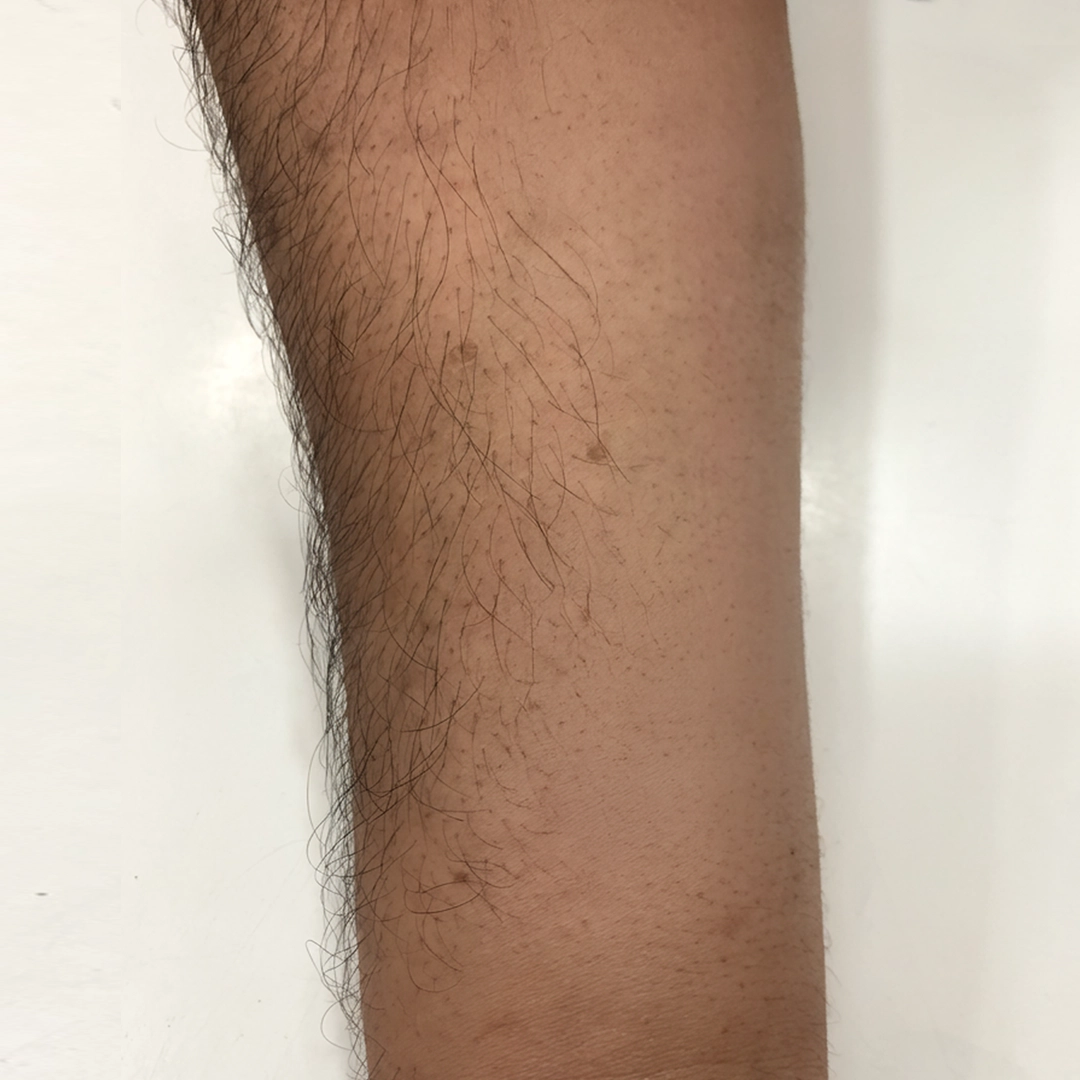
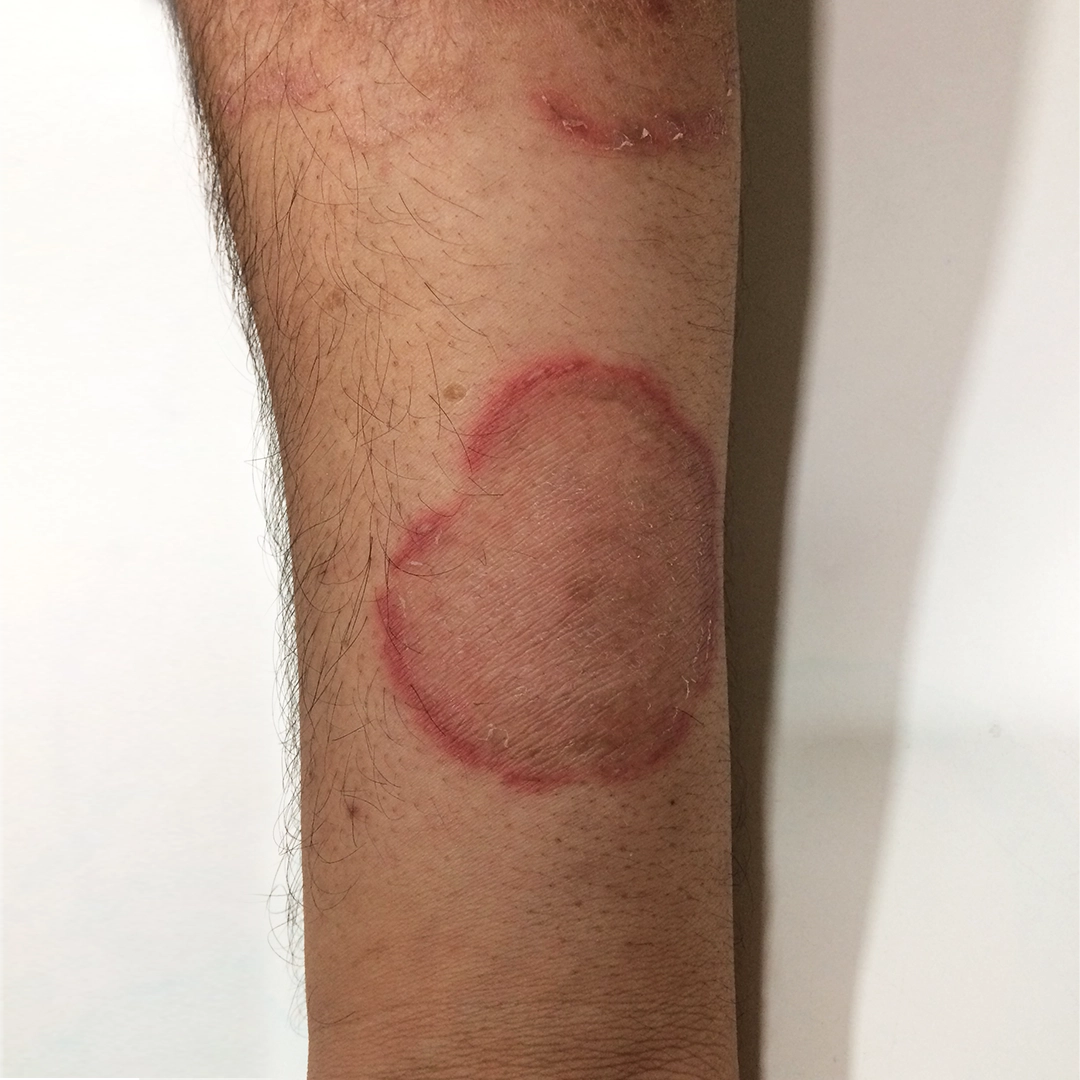

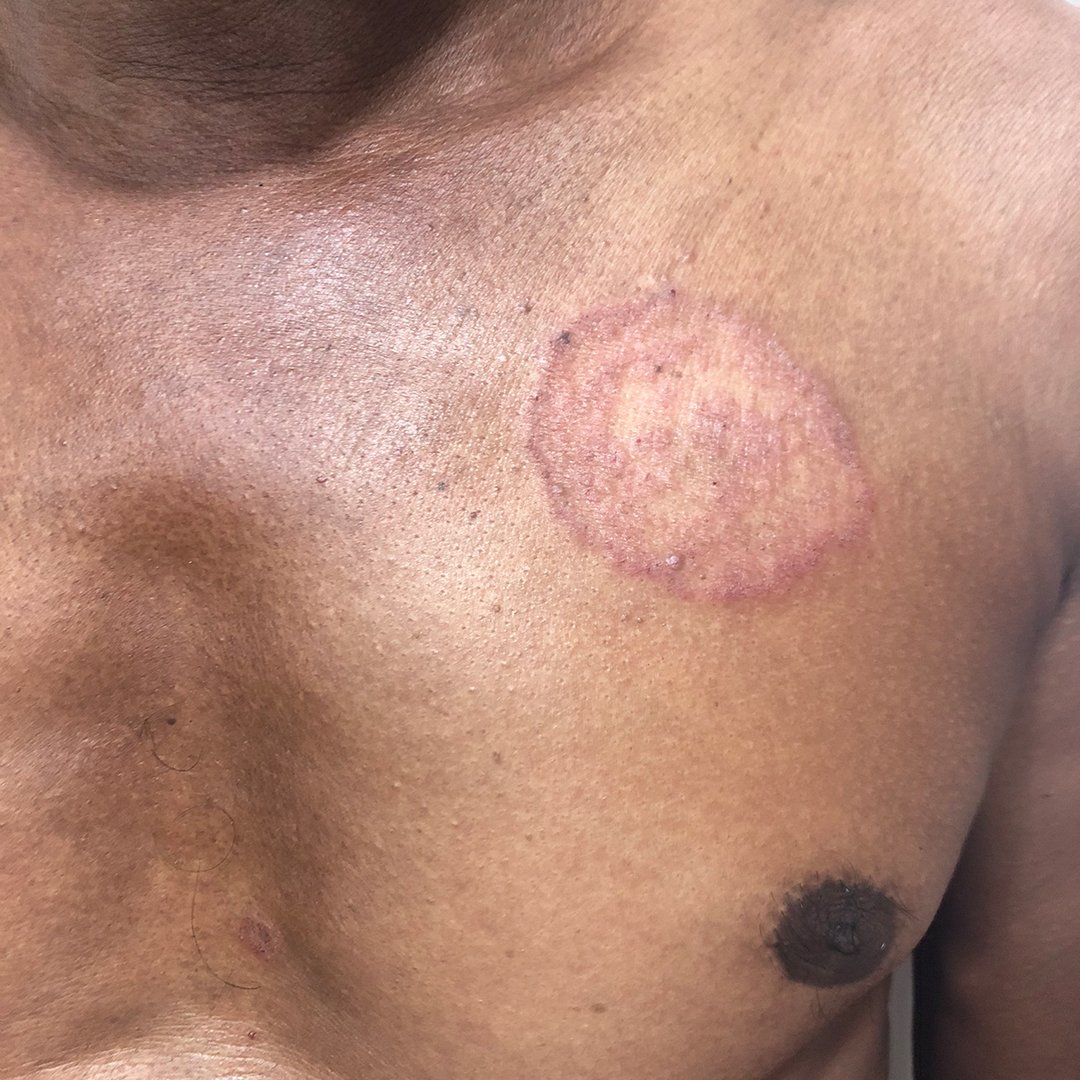




Comments
Krushi Vohera
Very informative! I always thought ringworm was just a minor rash, but after reading this I understand the symptoms much better. Knowing when to see a dermatologist makes all the difference in preventing it from spreading.
Chetan Pathak
This blog provides a clear and comprehensive explanation of what causes ringworm, which is often misunderstood. It's great that it also highlights when to seek help from a dermatologist—early consultation can prevent the infection from spreading or getting worse. Very helpful read!"
Post a comment